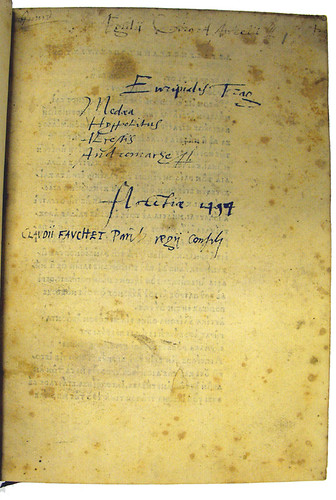Euripides: Tragoediae quattuor.
Medea, Hippolytus, Alcestis, Andromache [Greek].
Edited by Johannes Lascaris.
[Florence: Laurentius (Francisci) de Alopa, Venetus, before 18 June 1495]
4to. A-E8 f8 H-K8 2K8 Λ8 M2. [98] leaves.
ISTC ie00115000; GW 9431; Goff E115; BMC VI 667 (IA. 28010); Bod-inc E-038; CIBN E-89; BSB-Ink E-108.
| GIP number: | E6 |
| Shelf-mark: | Sp Coll Hunterian By.3.27 (see main library entry for this item). |
| Variants: | A3r, line 13: ‘ἘΥΦΡΈΝΕΤΑΙ’ as CIBN; A4r, line 2: ‘ΛΌΓΟΝ’ as CIBN; A5r, line 19: ‘ΤΆΚΟΥ’ as CIBN and BMC IA. 28010. |
| Note: | The signatures of quires 2K, Λ, M have been corrected to Λ, M, N in pen-and-ink by the printer as in BMC IA. 28009. |
| Provenance: | Aegidius Girard (16th century), of Orléans: inscription on A1r “Ægidii Girard Aurelii”. Claude Fauchet (1530-1602), Président de la Chambre des Monnaies and Historiographe de France: inscription on on A1r 'CLAVDII FAVCHET Paris[iensis] regij consilij' above which, in his hand, is a list of the four plays contained in the volume; also in Fauchet’s hand on the final page “Flore[n]tiae Impressu[m]". Louis Jean Gaignat (1697-1768), Secretary to King Louis XV: Gaignat sale, 1769; lot 1552 in Guillaume de Bure, Bibliographie instructive: supplément ... ou catalogue des livres de feu M. L.J. Gaignat, 2 vols (Paris: 1769). William Hunter (1718-1783), physician and anatomist: purchased by Hunter at the Gaignat sale through his agent, Jean-Baptiste Dessain, for 90 livres; see Dessain-Hunter correspondence (University of Glasgow Library, MS Gen. 36, f. 23v). University of Glasgow: Hunterian bequest, 1807; Hunterian Museum bookplate on front pastedown, with former shelfmark “K.7.10”. |
| Binding: | France, 18th-century blue goatskin; covers decorated with a triple gold-fillet border, a small gold fleuron at each corner; gold-tooled spine; gilt-edged leaves; marbled endpapers; pink silk bookmark. Size: 222 x 155 mm. |
| Leaf size: | 218 x 151 mm. |
| Annotations: | Copious marginal textual annotations in Greek and Latin in a 16th-century hand in the first three plays (Medea, Hippolytus, Alcestis) but not in Andromache; frequent underlining and nota marks. |
| Decoration: | None. |
| Imperfections: | None. |




